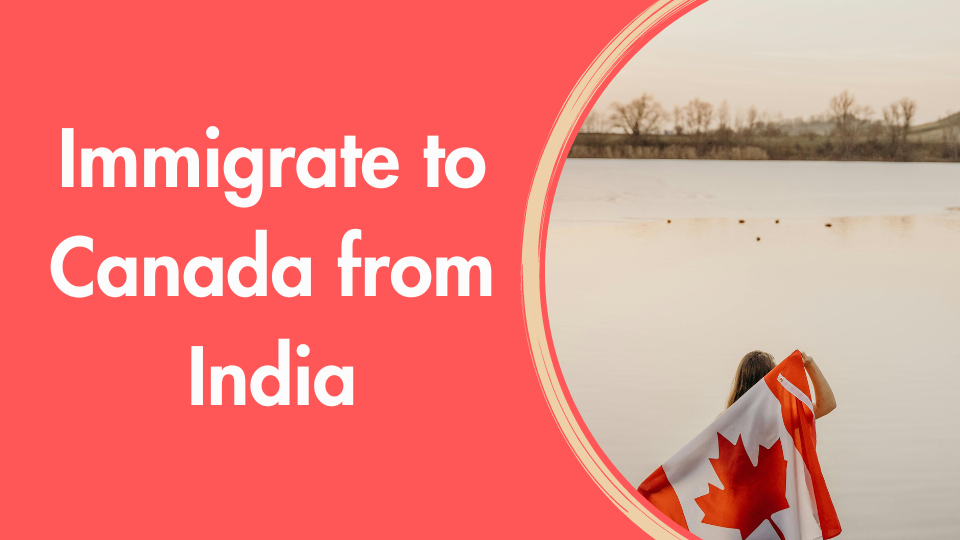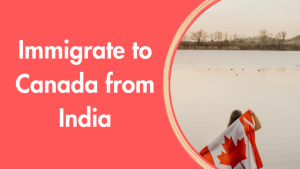The best 5 pathways to immigrate to Canada from India are Express Entry, Provincial Nominee Program, Family Sponsorship, Student Visa, and Startup Visa. Canada remains a top destination for Indian immigrants seeking better opportunities.
The country offers multiple pathways tailored to suit different needs and qualifications. Express Entry is a highly popular route due to its efficient processing times. Provincial Nominee Programs provide specific provinces the chance to nominate candidates based on local labor needs.
Family Sponsorship allows Canadian citizens or permanent residents to sponsor relatives. The Student Visa pathway is ideal for those aiming to pursue higher education and later gain permanent residency. Lastly, the Startup Visa targets entrepreneurs with innovative business ideas. Each pathway has distinct requirements, making it essential to choose the one that aligns best with your goals.
Express Entry System
Canada is a dream destination for many Indians seeking a better life. One of the best pathways to immigrate to Canada from India is the Express Entry System. This system is fast, efficient, and ranks applicants based on their skills and experience. It covers three federal economic immigration programs: the Federal Skilled Worker Program, the Federal Skilled Trades Program, and the Canadian Experience Class.
Eligibility Criteria
To apply for the Express Entry System, you must meet certain eligibility criteria. These criteria ensure you have the necessary skills, education, and work experience to contribute to the Canadian economy.
Here are the key criteria:
- Age: Applicants must be between 18 and 47 years old.
- Education: A minimum of a high school diploma is required.
- Work Experience: At least one year of full-time work experience in a skilled occupation.
- Language Proficiency: Proficiency in English or French, proven by tests like IELTS or TEF.
- Adaptability: Additional points if you or your spouse has previous study or work experience in Canada.
The table below summarizes the points system:
| Criteria | Maximum Points |
|---|---|
| Age | 12 |
| Education | 25 |
| Work Experience | 15 |
| Language Proficiency | 28 |
| Adaptability | 10 |
Application Process
The application process for the Express Entry System is streamlined and straightforward. Follow these steps to apply:
- Check Eligibility: Use the online tool to see if you meet the criteria.
- Create a Profile: Fill in details about your age, education, work experience, and language skills.
- Get an Invitation to Apply: If you score high enough, you will receive an invitation to apply for permanent residence.
- Submit Documents: Provide proof of your education, work experience, and language proficiency.
- Medical and Police Checks: Undergo medical exams and obtain police clearance certificates.
- Receive Confirmation: Once approved, you will receive confirmation of permanent residence.
Remember, the Express Entry System operates on a points-based system. Higher scores increase your chances of receiving an invitation to apply. Keep your profile updated and ensure all information is accurate.
Provincial Nominee Programs (PNPs)
Canada is a popular destination for immigrants from India. Among the best ways to immigrate is through the Provincial Nominee Programs (PNPs). These programs allow provinces and territories to nominate individuals who wish to settle in a particular area. PNPs provide a pathway to permanent residency for skilled workers, business owners, and students.
Overview Of PNPs
The Provincial Nominee Programs (PNPs) are immigration programs offered by Canada’s provinces and territories. Each province has its own unique PNP, tailored to its economic needs and labor market demands.
PNPs aim to attract individuals who have the skills and experience needed to contribute to the local economy. Successful nominees receive a provincial nomination, which boosts their chances of getting permanent residency.
Key Features of PNPs:
- Provincial nomination enhances your Express Entry profile.
- Specific streams for skilled workers, business owners, and graduates.
- Faster processing times compared to other immigration pathways.
- Each province has its own criteria and application process.
Popular Provincial Nominee Programs include:
| Province | Program Name |
|---|---|
| Ontario | Ontario Immigrant Nominee Program (OINP) |
| British Columbia | British Columbia Provincial Nominee Program (BC PNP) |
| Alberta | Alberta Immigrant Nominee Program (AINP) |
| Manitoba | Manitoba Provincial Nominee Program (MPNP) |
| Saskatchewan | Saskatchewan Immigrant Nominee Program (SINP) |
Eligibility And Application Process
Eligibility criteria for PNPs vary by province, but there are common requirements:
- Job offer from an employer in the province.
- Relevant work experience in the targeted occupation.
- Language proficiency in English or French.
- Educational qualifications relevant to the job.
- Proof of intent to reside in the nominating province.
The application process involves several steps:
- Research the PNPs of different provinces to find the best fit.
- Submit an Expression of Interest (EOI) if required.
- Apply to the province’s PNP program.
- Receive a provincial nomination if selected.
- Submit an application for permanent residency to the federal government.
Tips for a Successful Application:
- Ensure your documentation is complete and accurate.
- Prepare for language tests well in advance.
- Gather work experience letters from previous employers.
- Stay updated on the latest requirements of the PNP you choose.
For detailed information on each province’s PNP, visit the respective provincial immigration website.
Family Sponsorship
Immigrating to Canada from India offers various pathways. One of the most popular options is the Family Sponsorship program. This pathway allows Canadian citizens and permanent residents to sponsor their relatives to become permanent residents of Canada. It’s a great way to reunite families and build a new life together in Canada.
Eligibility Criteria
The Family Sponsorship program has specific eligibility criteria. First, the sponsor must be a Canadian citizen or a permanent resident. The sponsor must be at least 18 years old. They must also prove they can financially support the sponsored person.
- The sponsor must not be receiving social assistance, except for disability.
- The sponsor must sign an agreement to support the sponsored person for a certain period.
The sponsored person must also meet certain criteria. They must be a close relative of the sponsor. This includes spouses, common-law partners, parents, grandparents, and dependent children. The sponsored person must also pass medical, criminal, and background checks.
| Relationship | Age Requirement | Other Requirements |
|---|---|---|
| Spouse | 18 years or older | Valid marriage certificate |
| Common-law partner | 18 years or older | Proof of cohabitation for at least 1 year |
| Dependent child | Under 22 years | Unmarried and without children |
| Parent/Grandparent | No specific age | Proof of relationship |
Sponsorship Process
The sponsorship process involves several steps. First, the sponsor must obtain and complete the appropriate application package. This package includes forms and a checklist of required documents.
- Gather Documents: Collect all necessary documents like birth certificates, marriage certificates, and proof of financial stability.
- Submit Application: The completed application must be submitted to Immigration, Refugees and Citizenship Canada (IRCC).
- Pay Fees: The sponsor must pay the processing fees, which vary depending on the relationship to the sponsored person.
After submission, IRCC reviews the application. They may request additional information or documents. The sponsor and the sponsored person might also be called for an interview. If the application is approved, the sponsored person receives a Confirmation of Permanent Residence (COPR).
The final step is landing in Canada. Upon arrival, the sponsored person presents their COPR and undergoes a final examination. Once cleared, they become a permanent resident of Canada.
Study Permit Pathway
Are you considering moving to Canada from India? The Study Permit Pathway is one of the best options. This route allows you to study in Canada and offers a pathway to permanent residence. By studying in Canada, you gain a high-quality education and valuable work experience.
Benefits Of Studying In Canada
Studying in Canada provides numerous benefits:
- World-Class Education: Canadian universities and colleges are renowned for their academic excellence.
- Multicultural Environment: Experience a diverse culture and meet people from around the world.
- Affordable Tuition: Tuition fees in Canada are generally more affordable than in other countries like the USA and UK.
- Work While Studying: International students can work up to 20 hours per week during semesters and full-time during breaks.
- Pathway to Permanent Residence: Graduates can apply for a Post-Graduation Work Permit (PGWP) and eventually for permanent residence.
Canada’s education system is globally recognized. Degrees from Canadian institutions are highly valued by employers worldwide. The country also offers numerous scholarships and financial aid options for international students.
Post-graduation Work Permit
The Post-Graduation Work Permit (PGWP) is a significant advantage for international students:
- Work Experience: Gain valuable Canadian work experience after graduation.
- Duration: PGWPs can be valid for up to three years, depending on the length of your study program.
- Open Work Permit: You can work for any employer in Canada with a PGWP.
- Path to PR: The work experience gained through a PGWP can help you qualify for permanent residence through programs like the Canadian Experience Class (CEC).
To be eligible for a PGWP, you must have completed a study program at a designated learning institution (DLI) in Canada. The program must be at least eight months long. Applications for the PGWP must be submitted within 180 days of receiving your final marks.
PGWPs offer a seamless transition from student life to working life in Canada. This work experience is crucial for those aiming for permanent residence.
Work Permit Pathway
Canada is a popular destination for immigrants from India. One of the top ways to immigrate is through the Work Permit Pathway. This pathway allows skilled workers to live and work in Canada temporarily or permanently. Understanding the different types of work permits and how employer sponsorship works is crucial for a successful application.
Types Of Work Permits
There are different types of work permits available for those wishing to work in Canada. Each type has specific requirements and benefits.
- Open Work Permit: This permit allows you to work for any employer in Canada. You don’t need a job offer before applying.
- Employer-Specific Work Permit: This permit is tied to a specific employer. You must have a job offer from a Canadian employer to apply.
- Post-Graduation Work Permit (PGWP): This permit is for students who have graduated from a Canadian educational institution. It allows you to work in Canada for up to three years.
- Temporary Foreign Worker Program (TFWP): This program allows employers to hire foreign workers to fill temporary labor shortages. A Labour Market Impact Assessment (LMIA) is usually required.
Here is a comparison table of the different types of work permits:
| Type of Permit | Eligibility | Duration | Employer Requirement |
|---|---|---|---|
| Open Work Permit | Anyone | Up to 3 years | None |
| Employer-Specific Work Permit | Job Offer Required | Varies by job offer | Specific Employer |
| Post-Graduation Work Permit | Graduates from Canadian institutions | Up to 3 years | None |
| Temporary Foreign Worker Program | Job Offer & LMIA | Varies by job offer | Specific Employer |
Employer Sponsorship
Employer sponsorship is a crucial aspect of the work permit pathway. It involves a Canadian employer sponsoring a foreign worker to come and work in Canada. The process often requires a Labour Market Impact Assessment (LMIA), which proves that hiring a foreign worker will not negatively impact the Canadian labor market.
Here are the key steps involved in employer sponsorship:
- Job Offer: A Canadian employer must first offer you a job.
- LMIA Application: The employer then applies for an LMIA from Employment and Social Development Canada (ESDC). This step can take several weeks.
- Work Permit Application: Once the LMIA is approved, you can apply for a work permit. This step involves submitting your job offer, LMIA, and other required documents.
- Work Permit Approval: If your application is approved, you will receive a work permit that allows you to work for the sponsoring employer in Canada.
Employer sponsorship can lead to permanent residency through programs like the Canadian Experience Class (CEC) or the Provincial Nominee Program (PNP). These programs offer pathways to become a permanent resident if you have Canadian work experience.
Ensure that your employer is legitimate and the job offer is genuine. Scams and fraudulent job offers are common, so always verify the employer’s credentials.
Business Immigration
Canada offers numerous immigration pathways for Indian citizens. One of the most attractive routes is Business Immigration. This pathway is ideal for those with business experience and investment capital. It allows individuals to contribute to the Canadian economy while enjoying a high standard of living. Let’s explore two key programs under Business Immigration: the Investor Immigration Program and the Entrepreneur Immigration Program.
Investor Immigration Program
The Investor Immigration Program is designed for high-net-worth individuals. It requires a significant investment in the Canadian economy. Here are the key features:
- Investment Requirement: Applicants must invest a minimum of CAD 1.2 million.
- Net Worth: A personal net worth of at least CAD 2 million is required.
- Management Experience: Applicants must have at least two years of managerial experience.
This program offers several benefits:
- Permanent Residency: Successful applicants receive Canadian permanent residency.
- Family Inclusion: Immediate family members can also obtain residency.
- Economic Stability: Canada has a stable and prosperous economy.
Below is a table summarizing the key requirements:
| Criteria | Requirement |
|---|---|
| Investment | CAD 1.2 million |
| Net Worth | CAD 2 million |
| Experience | 2 years in management |
Entrepreneur Immigration Program
The Entrepreneur Immigration Program targets individuals who wish to create and manage a business in Canada. This program has unique requirements and benefits:
- Business Proposal: Applicants must present a viable business plan.
- Investment: A minimum investment of CAD 200,000 is required.
- Ownership: Applicants must own at least 33.33% of the business.
Benefits of this program include:
- Job Creation: Entrepreneurs must create jobs for Canadians.
- Community Impact: Businesses should benefit local communities.
- Permanent Residency: Successful applicants and their families receive residency.
Here is a table with the key details:
| Criteria | Requirement |
|---|---|
| Business Plan | Viable and comprehensive |
| Investment | CAD 200,000 |
| Ownership | 33.33% minimum |
Both programs offer a pathway to Canadian residency while contributing to the economy. Consider these options if you have the required resources and experience.
Conclusion
Choosing the right pathway to immigrate to Canada from India can transform your future. Each option has its unique benefits. Research thoroughly and select the one that best fits your needs. Start your journey to a new life in Canada with confidence and well-informed decisions.




